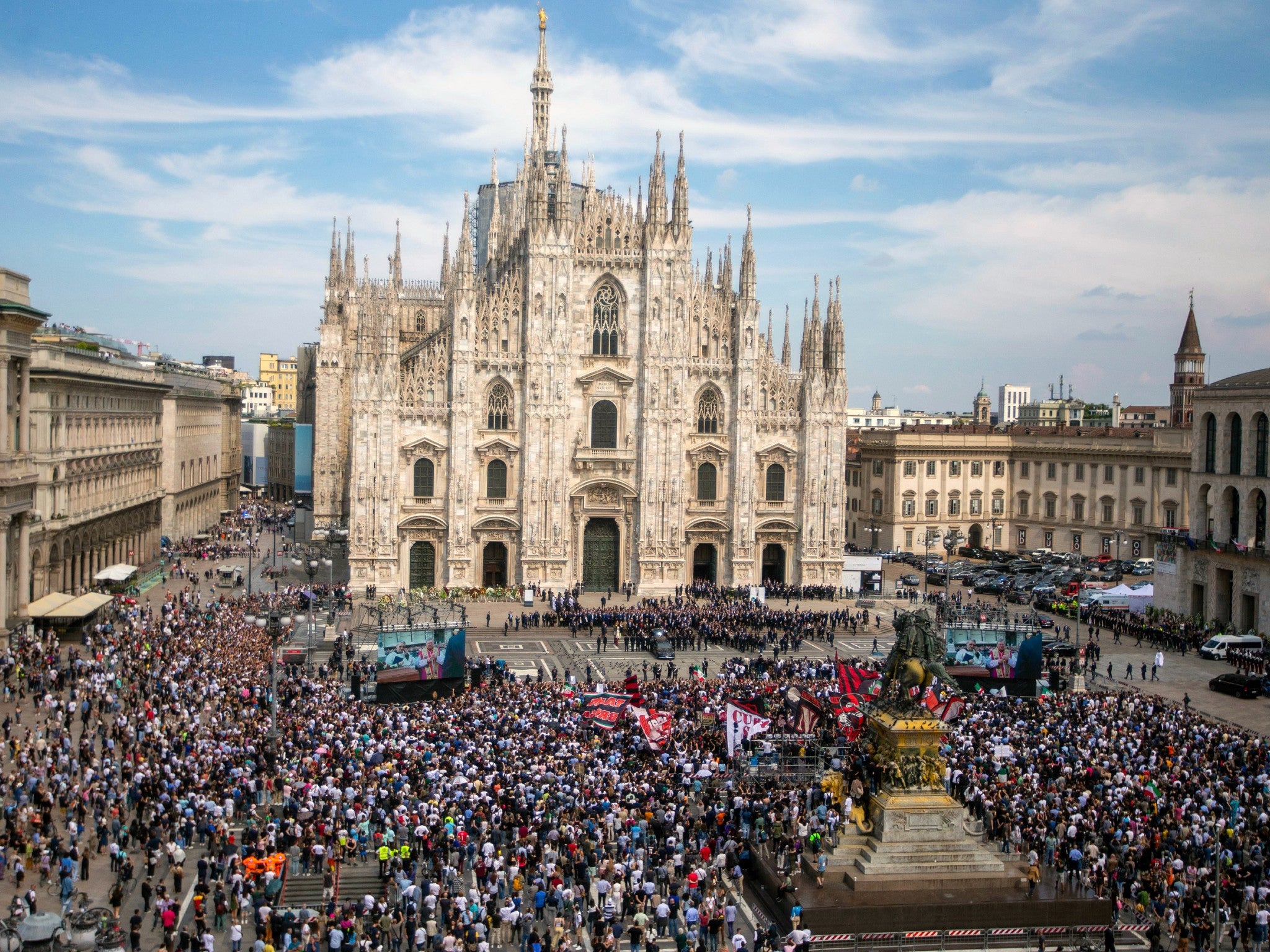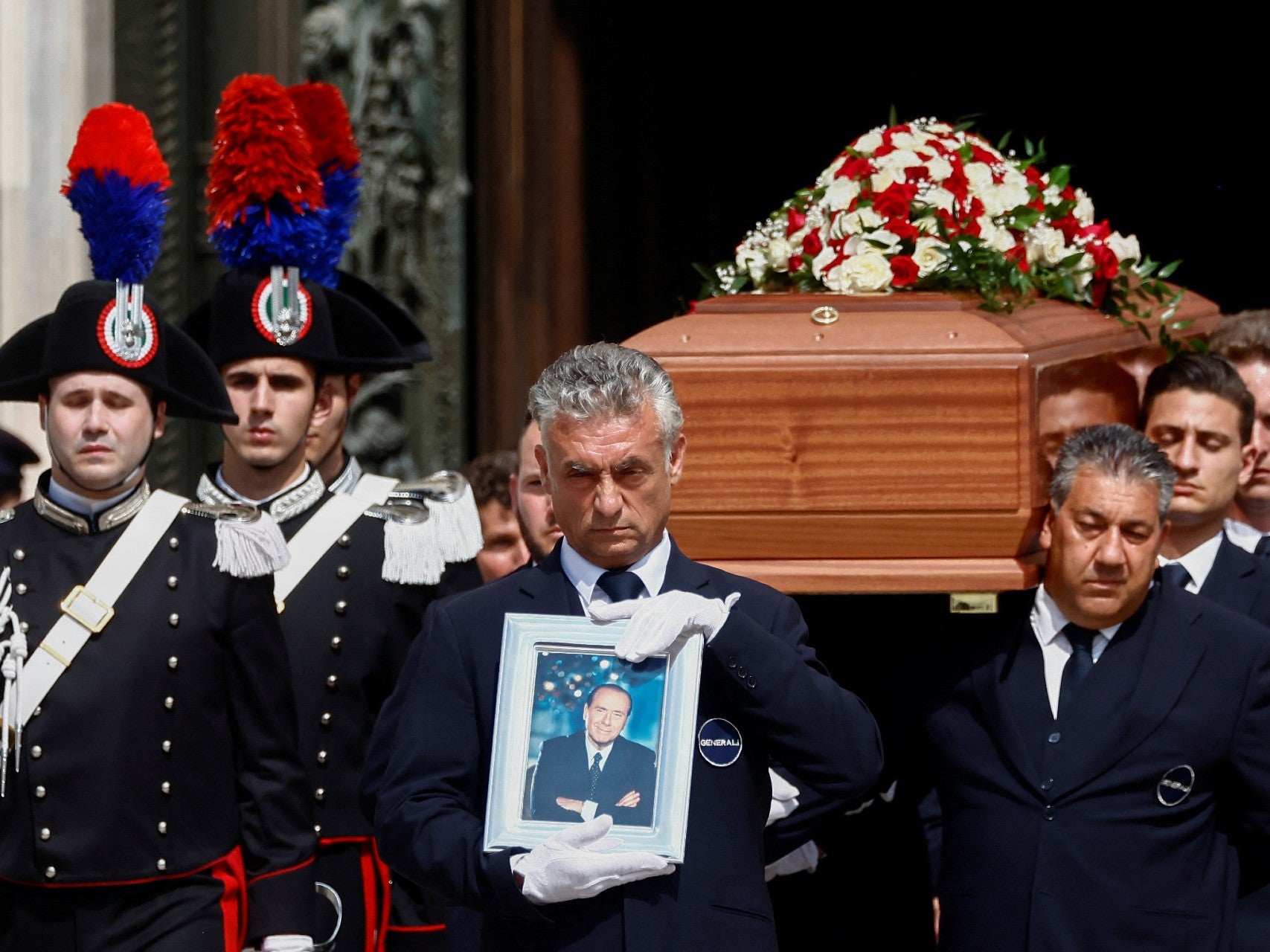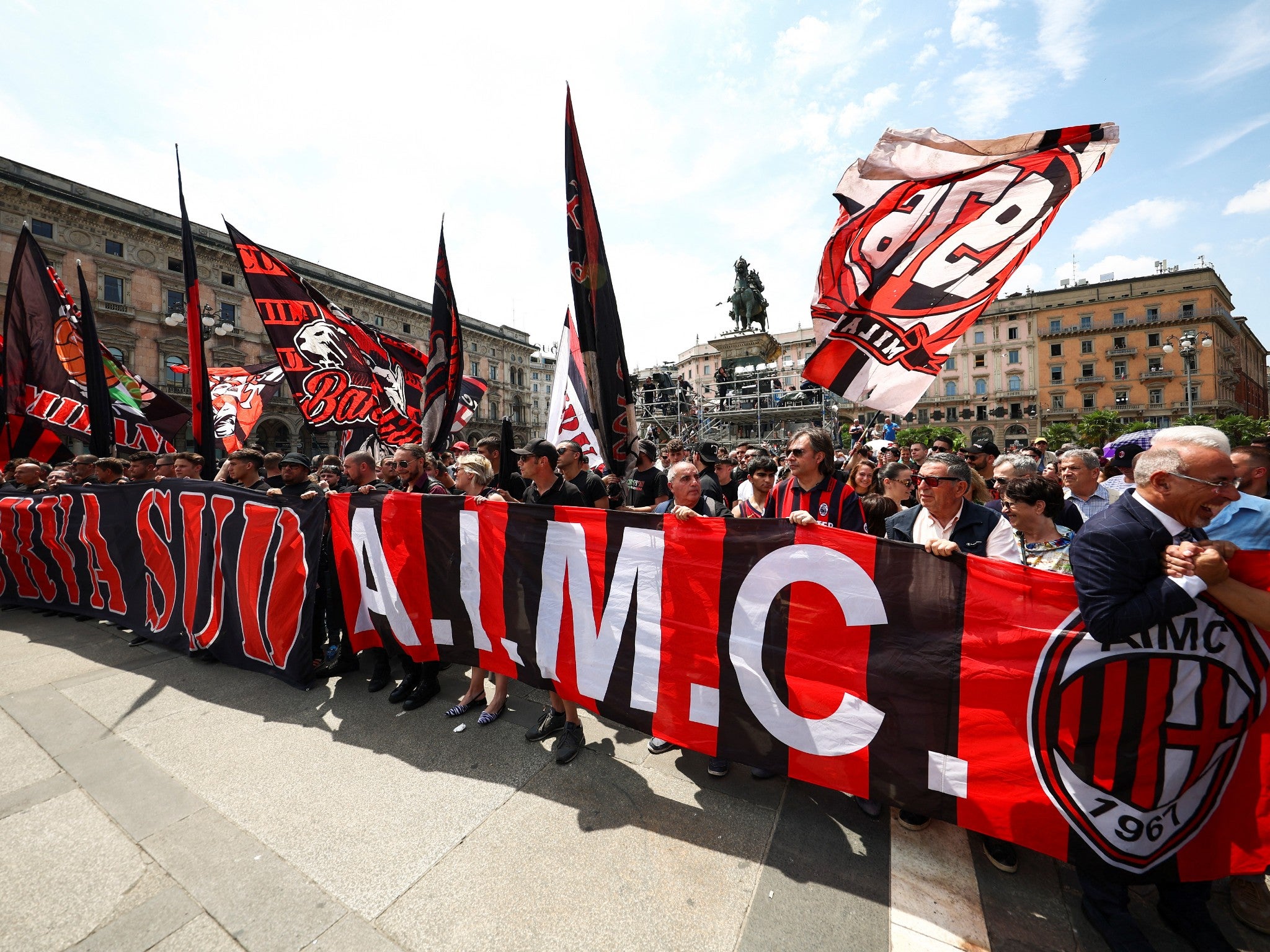Milan bids farewell to Berlusconi – what next for his billion-pound business and political empire?
Thousands turned out for the state funeral of a divisive former prime minister, writes Chris Stevenson. But what now for his businesses and the political party he crafted in his image?


If there was any doubt just how much Silvio Berlusconi courted controversy and divided opinion, his state funeral in Milan offered a clear picture.
The casket containing the former prime minister was serenaded by some of the thousands who gathered outside Milan’s Duomo – fans of AC Milan football club carrying flags and scarves dedicated to their former owner – with the chant, “One president, there’s only one president” as it was carried both into and then out of the cathedral. Two giant video screens relayed the service to those in the square, while carabinieri in full ceremonial regalia stood guard, surrounded by floral wreaths.
Italy’s prime minister, Giorgia Meloni, who got her first government experience as a minister in a Berlusconi coalition, attended, along with League leader Matteo Salvini, whose party has long been allied with Berlusconi’s Forza Italia. President Sergio Mattarella and former premiers Matteo Renzi, Paolo Gentiloni and Mario Draghi were also present. The Hungarian president, Viktor Orban, and Qatar’s ruling emir, Sheikh Tamim bin Hamad Al Thani, were among the highest-ranking foreign dignitaries.
But some opposition politicians, including former premier Giuseppe Conte, refused to attend the service. Former centre-left minister Rosy Bindi said an “inappropriate sanctification” was taking place. Bindi, often targeted by Berlusconi’s sexist jibes, said the national day of mourning was “disrespectful towards the majority” of Italians who opposed the late leader.
The pomp and circumstance would have suited Berlusconi, who always tried to live up to his larger-than-life reputation. But the declaration of a national day of mourning by the government left a sour taste in the mouth of others. It was not a public holiday, but a symbolic tribute in which flags flew at half-mast from public buildings – but some refused. Tomaso Montanari, rector of the Università per Stranieri di Siena, declined to respect the order, saying that by flying flags at half-mast for Berlusconi his university would “lose all educational and moral credibility”.
The archbishop of Milan, Mario Delpini, did not gloss over Berlusconi’s complicated – to put it charitably – legacy in his eulogy, saying he was a businessman who found success and failure, a politician who won and lost, and a notoriety-seeking personality who had admirers and detractors, “those who applaud him and those who detest him”.

“But in this moment of farewell and prayer, what can we say about Silvio Berlusconi? He has been a man: a desire for life, a desire for love, a desire for joy,” he said. “He is a man and now he meets God.”
Berlusconi, nicknamed Il Cavaliere (the Knight), certainly held an outsized grip on Italy’s political life for three decades with his Forza Italia party. For his detractors – often as deeply entrenched as the loyalist supporters who backed him through thick and thin – the amount of political damage the former leader caused is long, including conflicts of interest relating to his media empire, dozens of trials mostly for business dealings (but only one conviction, for tax fraud), revelations of “bunga bunga” parties and associations such as his friendship with the Russian leader Vladimir Putin.
His family held a private wake on Tuesday at one of his villas near Milan, the base where he made his billions as the head of a media empire before entering politics in 1994. There were reports that his body would be cremated and his ashes taken to the family mausoleum in the grounds of a villa in the northern town of Arcore. The family also took out full-page newspaper advertisements via his media company MFE. The message from his five children read: “Sweetest Dad, Thank you for your life, Thank you for your love, You will always live inside us.”
Across his lifetime, Berlusconi crafted a vast empire – worth around £5bn – that spanned media, real estate, finance, cinema and sport, as well as Forza Italia. The question now is, how will it all be run? Fininvest, the Berlusconi family trust, controls a host of companies and Berlusconi held onto a 61 per cent stake until his death. How it will be divided up among his children is unknown, or whether it will end up being broken up. A test is coming at the end month when it holds its first shareholder meeting since Berlusconi’s death.

Berlusconi had two children, Marina and Pier Silvio, with his first wife, Carla Dall’Oglio. They each hold 7.65 per cent stakes in Fininvest. The three children with his second wife, Veronica Lario – Luigi, Eleonora and Barbara – hold a combined stake of 21.42 per cent. If Berlusconi’s stake was divided equally among all five, then that would be an advantage to the children from his second marriage.
However, Marina and Pier Silvio hold senior positions in the business, especially Marina, 56, who has headed up Fininvest since 2005, having been involved in Berlusconi’s business empire from a young age. Her nickname, the Tsarina, or Iron Princess, gives a sense of the regard in which she is held. Fininvest issued a statement this week saying that its business activities “will continue in a line of absolute continuity in every respect”. Given the sums involved, it might appear unwise for any of the children, or Berlusconi’s partner, Marta Fascina, to try and upset the apple cart.
So what of Forza Italia? There have been suggestions that Marina could take over, but she appears to have shown little interest so far in entering politics in the same way as her father. If it is to be Berlusconi’s two eldest who hold the purse strings, would they want to keep investing long term in a political vehicle that was built so tightly around Silvio’s character? Prime Minister Meloni will want to keep an eye on the 8 per cent of the vote the party collected in last year’s general election, but probably won’t be too concerned – at least for now – about the state of her coalition.
Berlusconi’s right-hand man, foreign minister Antonio Tajani, has categorically denied its future is at risk: “It’s unthinkable that the party would disappear.” Time will tell, but the death of Berlusconi has certainly left a hole in Italy’s political and business worlds.
Reuters and Associated Press contributed to this report






Join our commenting forum
Join thought-provoking conversations, follow other Independent readers and see their replies
Comments